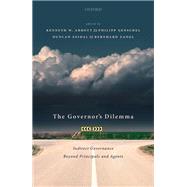
The Governor's Dilemma
by Kenneth W. Abbott; Bernhard Zangl; Duncan Snidal-
 eCampus.com Device Compatibility Matrix
eCampus.com Device Compatibility Matrix
Click the device icon to install or view instructions
Rent Textbook
Rent Digital
New Textbook
We're Sorry
Sold Out
Used Textbook
We're Sorry
Sold Out
Summary
Author Biography
Kenneth W. Abbott, Jack E. Brown Chair in Law and Professor of Global Studies Emeritus, Arizona State University,Bernhard Zangl, Professor of Global Governance, LMU Munich,Duncan Snidal, Professor of International Relations, Nuffield College, University of Oxford,Philipp Genschel, Professor of Comparative and European Public Policy, Department of Political and Social Sciences & Robert Schuman Centre for Advanced Studies, European University Institute, Florence
Kenneth W. Abbott is Jack E. Brown Chair in Law and Professor of Global Studies Emeritus at Arizona State University. His research focuses on the interdisciplinary study of international institutions, international law, and international relations. He studies public and private governance in fields including environmental protection and he held the Elizabeth Froehling Horner Chair at Northwestern University School of Law, and served as director of Northwestern's Center for International and Comparative Studies. He is a Lead Faculty member of the Earth System Governance Project, and a member of the editorial boards of International Theory, Regulation & Governance, and Journal of International Economic Law.
Bernhard Zangl is a Professor of Global Governance at LMU Munich's Geschwister-Scholl-Institute of Political Science. His research focuses on the role of international institutions in global governance. He is a co-editor of International Organizations as Orchestrators. His research was published in the Annual Review of Political Science, British Journal of Political Science, European Journal of International Relations, International Studies Quarterly, Review of International Organizations, Journal of Common Market Studies among others. He studied in T?bingen and Pisa, holds a PhD from the Universit?t Bremen, and has held visiting positions at the European University Institute, Harvard University, Northwestern University, and the Berlin Social Science Center.
Duncan Snidal is Professor of International Relations at the University of Oxford and a fellow of both Nuffield College and the British Academy; he previously taught at the University of Chicago. His research focuses on problems of international cooperation and institutions with an emphasis on institutional design. He is co-editor of International Organizations as Orchestrators and co-author of Institutional Choice and Global Commerce. Recent articles have appeared in International Organization, British Journal of Political Science, Journal of Conflict Resolution and the Annals of the American Academy. He is cofounder of the journal International Theory and general co-editor of a forthcoming twelve volume set of Oxford Handbooks of International Relations.
Philipp Genschel is Professor of Comparative and European Public Policy at the European University Institute in Florence; he is on leave from Jacobs University Bremen. His research focuses on the political economy of governance at the national, the European and the international level. He is co-editor of Beyond the Regulatory Polity? The European Integration of Core State Powers (OUP 2014), of International Organizations as Orchestrators (CUP 2015), and of the Tax Introduction Database. Recent articles have appeared in British Journal of Political Science, Journal of Common Market Studies, Review of International Political Economy and Review of International Organization.
Table of Contents
Part I. Theoretical Framework
1. Competence-Control Theory: The Challenge of Governing through Intermediaries, Kenneth W. Abbott, Philipp Genschel, Duncan Snidal, and Bernhard Zangl
Part II. Governing Violence
2. The Governor's Dilemma in Colonial Empires, Paul K. MacDonald
3. The Authoritarian Governor's Dilemma: Controlling the Secret Police in Socialist Poland and East Germany, Henry Thomson
4. Competence over Control: The Politics of Multilateral Weapons Inspections, Alexander Thompson
5. Militias and the Iraqi State: Shifting Modes of Indirect Governance, Idean Salehyan
6. The Invader's Dilemma: Enlisting Rebel Groups, Henning Tamm
7. Governing Private Security Companies: Politics, Dependence and Control, Andreas Kruck
Part III. Governing Markets
8. Governing Capital Markets, Jack Seddon and Walter Mattli
9. Balancing Competence and Control: Indirect Governance "Triangles" in EU Regulation, Felix Biermann and Berthold Rittberger
10. Indirect Governance in Global Financial Regulation, Thomas Rixen and Lora Viola
11. Managing the Euro Crisis: Why Enlist the IMF?, Manuela Moschella
12. Governing Markets in Autocratic Regimes, Johannes Gerschewski
Part IV. Implications for Democracy
13. Trump's Dilemma, Mark A. Pollack
An electronic version of this book is available through VitalSource.
This book is viewable on PC, Mac, iPhone, iPad, iPod Touch, and most smartphones.
By purchasing, you will be able to view this book online, as well as download it, for the chosen number of days.
Digital License
You are licensing a digital product for a set duration. Durations are set forth in the product description, with "Lifetime" typically meaning five (5) years of online access and permanent download to a supported device. All licenses are non-transferable.
More details can be found here.
A downloadable version of this book is available through the eCampus Reader or compatible Adobe readers.
Applications are available on iOS, Android, PC, Mac, and Windows Mobile platforms.
Please view the compatibility matrix prior to purchase.

